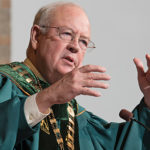Posted: 10/19/07
Revised version of book Baylor rejected
explores issues of faith and learning
By Ken Camp
Managing Editor
An interpretive history of Baylor University’s recent years—originally slated for publication under the university’s name but rejected by the school’s administration last year—will be released next month by a conservative publisher in South Bend, Ind.
Some changes made at Baylor University in the last two decades—membership in the Big XII athletic conference, a new tuition structure, and expansive and expensive building projects—seem set in concrete for the immediate future.
But contributors to a revised edition of the previously rejected book insist the jury remains out on a pivotal question: “Can a Protestant university be a first-class research institution and preserve its soul?”
Editors Don Schmeltekopf, provost emeritus and director of Baylor’s Center for Ministry Effectiveness and Educational Leadership, and history professor Barry Hankins enlisted a dozen other contributing writers to explore the question from varied angles in The Baylor Project: Taking Christian Higher Education to the Next Level.
“Baylor seems to have moved beyond the crossroads. … What remains unsettled principally are the issues surrounding faith and learning, or how Christian belief and the Christian intellectual tradition are to engage our common academic life, and the question of Baylor’s identity as a university,” Hankins and Schmeltekopf wrote in the preface.
Those unsettled questions—along with allegiances to some strong personalities related to Baylor who have offered starkly different answers—contributed to the controversy that swirled around the book even before its publication.
Originally titled Baylor Beyond the Crossroads: An Interpretive History, 1985-2000, the manuscript was rejected last year first by Baylor University Press, the school’s academic publishing house, and later by the university itself.
The announcement by Baylor administrators to reverse their plans to publish the book came one week after former Baylor President Herbert Reynolds—now deceased—sent a sharply worded e-mail to the volume’s editors. However, university officials insisted their decision to withdraw support for the book predated the e-mail by several months and was based on “policy issues and legal issues associated with the university’s name.”
St. Augustine’s Press, a nonprofit, nondenominational press that specializes in books related to philosophy, theology, and cultural and intellectual history, will release the revised book Nov. 16.
“Our mission is to offer exceptional works that draw from, exhibit and advance Western civilization and particularly the traditional Judeo-Christian roots of that civilization,” according to the mission statement posted on the publisher’s website. “Toward that end, we focus our attention on the timeless work over the timely, the classic over the atypical, the orthodox over the heterodox.”
That kind of language—with its emphasis on orthodoxy and social conservatism—typifies the way Baylor University under former President Robert Sloan looked for common ground with Roman Catholics and northern evangelicals while rejecting principles dear to historic Texas Baptists, according to economics professor Kent Gilbreath.
Gilbreath, a frequent critic of the Sloan administration, wrote a chapter for the original edition of the book that the editors rejected. At least two other writers withdrew their chapters.
Baylor 2012, the university’s 10-year strategic vision, became a vehicle for the Sloan administration to “reconstruct Baylor” into a different kind of institution than the school Texas Baptists had supported, Gilbreath insisted. He believes “a small group of faculty and administrators were seeking to move Baylor away from its Texas Baptist roots and toward a new theological base that reflected a combination of northern evangelicalism coupled with religious hierarchical structures.”
Gilbreath drew parallels between the “theological correctness” he and some others perceived as implicit in the implementation of Baylor 2012 and the tests of “theological purity” imposed by fundamentalists who took over the Southern Baptist Convention.
But several contributors to The Baylor Project insisted Baylor and other universities with religious roots are endangered more by secularism than fundamentalism. The mainstream Baptist emphasis on freedom had become quite thoroughly absorbed into the dominant American culture, Hunter Baker argued in his chapter, “The Struggle for Baylor’s Soul.”
“Freedom of conscience is arguably the single most powerful American value. … If anything, modern Americans might have too much freedom given the destructive choices many individuals make,” wrote Hunter, director of strategic planning at Houston Baptist University and doctoral fellow in Baylor’s Institute of Church-State Studies. “These facts lead one to wonder whether concerns about coercion are legitimate today, particularly at a university that tolerates a wide diversity of opinion within the confines of what Schmeltekopf calls ecumenical orthodoxy.”
Sloan himself, now president of Houston Baptist University, essentially made the same point in the concluding chapter of The Baylor Project.
“In our generation, the greatest enemy to the Christian vitality and Baptist heritage of Baylor is not fundamentalism,” Sloan wrote. “Though fundamentalism has been a threat to the religious identity of Baylor in times past and though fundamentalism can be, and often is, associated with factionalism, sectarianism and divisiveness and in those forms needs to be either earnestly avoided or corrected where possible, I believe the greatest threat to the continuation of Baylor’s academic excellence today as an institution committed to the Lordship of Jesus Christ is from the pervasive secularism and loss of traditional moral virtues which so characterize our present world.”
Baylor 2012 represented neither the fundamentalist model of Christian indoctrination nor the model of a religiously affiliated university that differs from a secular institution only in its Christian environment, Sloan noted.
“My not-so-radical claim (though often considered so by some in the Baylor community) is that the Christian faith has real intellectual content,” Sloan wrote. “It is relevant to our everyday lives and provides a vital frame of reference from which we might engage constructively with the larger culture. The ‘integration of faith and learning’ institutionalized and publicized at Baylor is not a mere slogan, but is in fact a legitimate and creative way of undertaking the scholarly enterprise.”
Sloan insisted controversy grew out of differences over substance of the Baylor 2012 vision—particularly its emphasis on the integration of faith and learning—and not his management style or the way he implemented the long-range plan.
“If the critics of my administration had been more agreeable to the substance of Baylor 2012’s spiritual, academic and theological vision for Baylor, controversies over management would have been of little longstanding consequence,” he wrote. “It is not really a question of how things were done; it is a question of what was done.”
Gilbreath strongly disagrees. He subscribes to the Baylor 2012 goal of a Christian university that offers academic excellence, but he saw “a slippery slope toward theological intolerance” within that vision as interpreted by the Sloan administration.
“It was not the hope embodied in the goals of Baylor 2012 that caused Baylor’s subsequent problems; it was in the vision’s implementation where things went wrong,” he wrote. “From the beginning, Baylor’s administration made a series of decisions that steered Baylor and Baylor 2012 straight onto the rocks.”
For his part, while he defended the Baylor 2012 vision and the goal of intentionally integrating Christian faith into the university learning environment, Sloan acknowledged imperfection.
“What all of us must remember with all of our investments of ego and partisanship in these matters, is that no period in Baylor’s history, no leader and no clique of faculty or alumni, has ever fully got it right,” Sloan wrote. “There is always more work to be done. There is never an adequate amount of either charity or passion to make any one generation or individual equal to the task of God’s calling.”















We seek to connect God’s story and God’s people around the world. To learn more about God’s story, click here.
Send comments and feedback to Eric Black, our editor. For comments to be published, please specify “letter to the editor.” Maximum length for publication is 300 words.